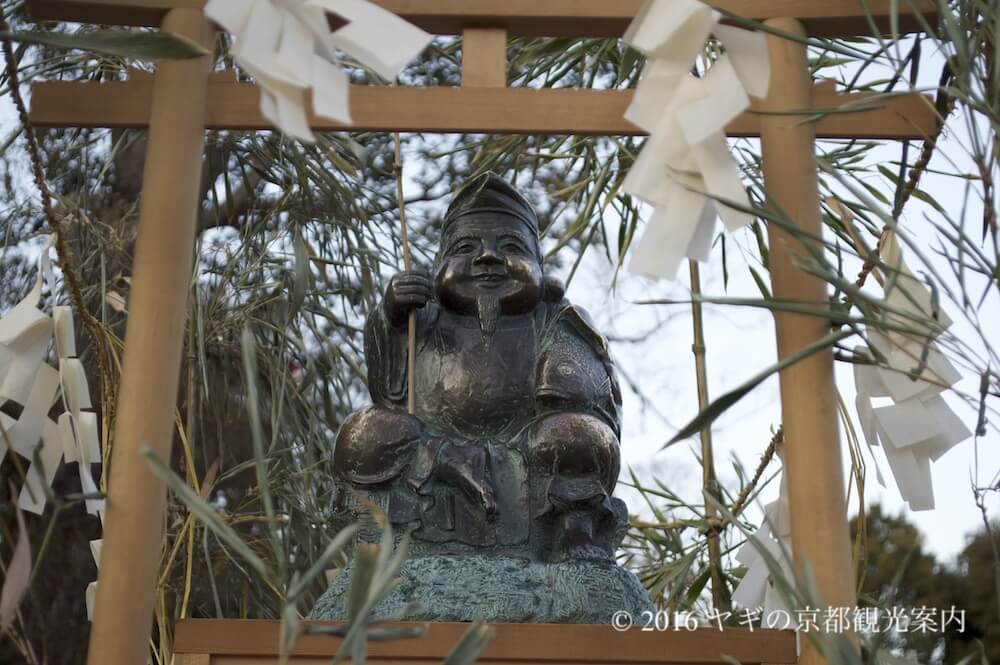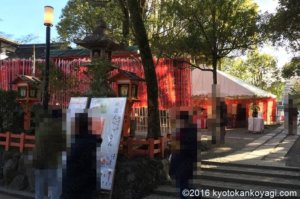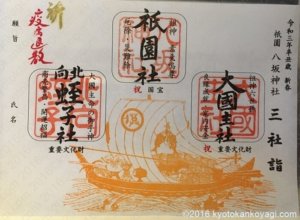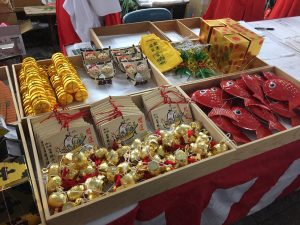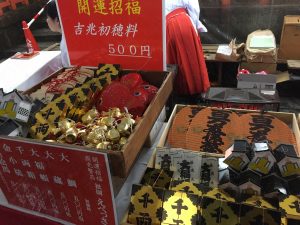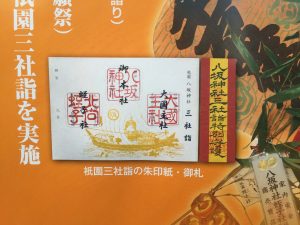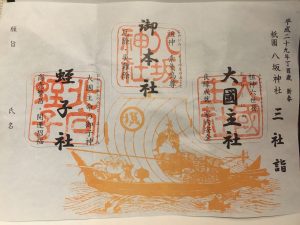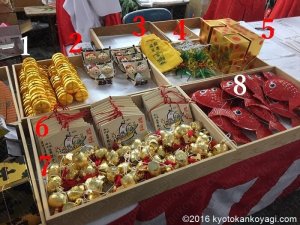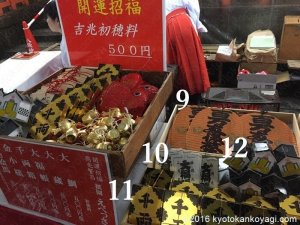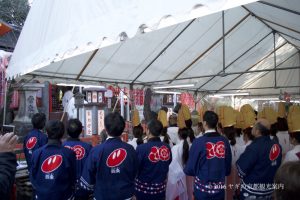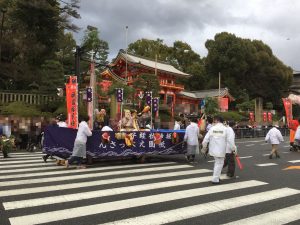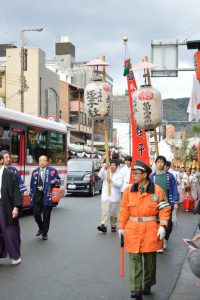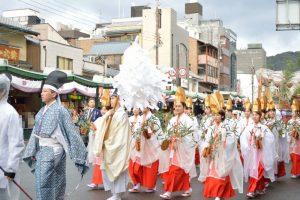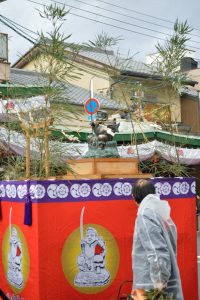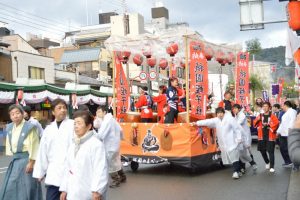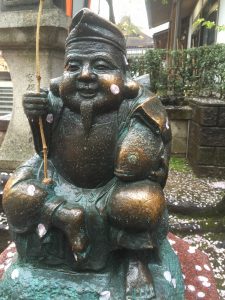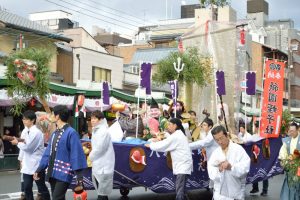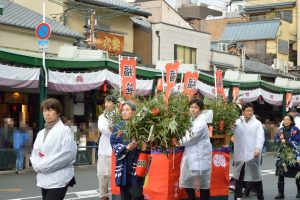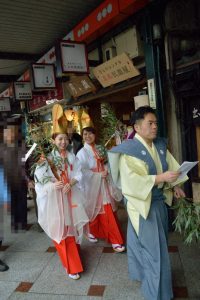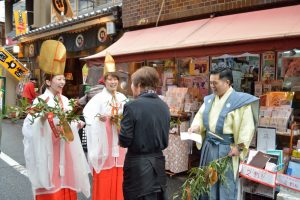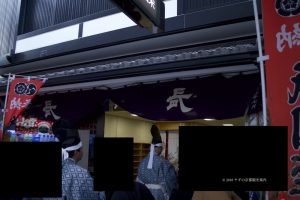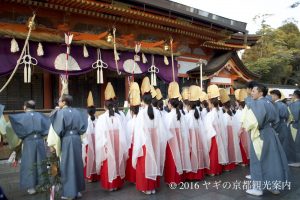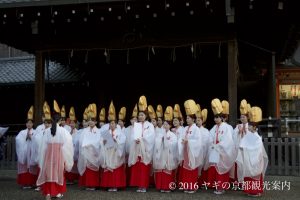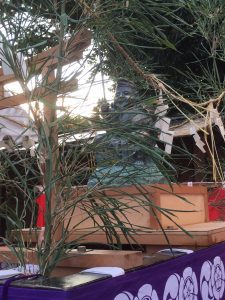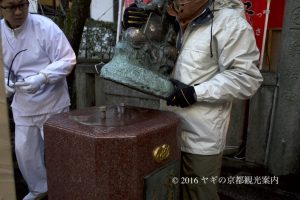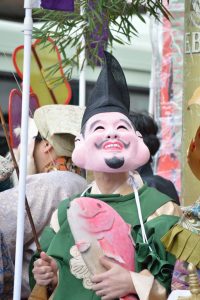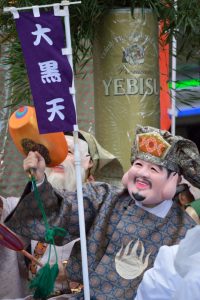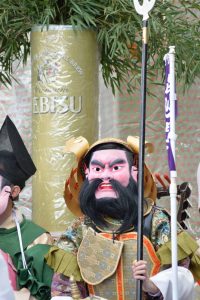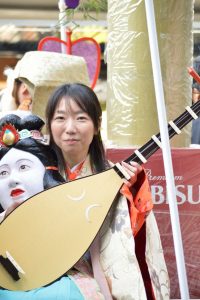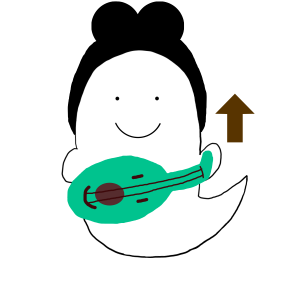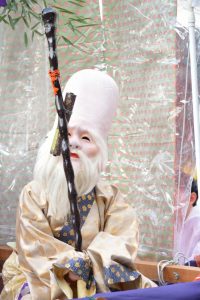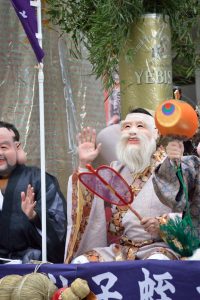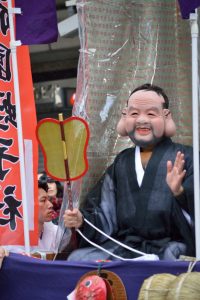Overveiw on Gion Ebessan/Ebisu festival
- Ebessan a.k.a. is one of Sven Deities of fortune and give us prosperity for business and cultivation.
- In Kansai region, people celebrate “Toka Ebisu” to ask Ebessan for the prosperity on Jan. 10th because he was born on the day.
- At Yasaka shrine, “Gion Ebessan” festival takes place.
- On the day, these Deities on “Ebessan boat” parade through Shijo street.
- On the cruise, Fukumusume accompany the boat to give Fukuzasa to stores along the street.
- We make Sansya mode visit and collect special Goshuin stamp.
- In 2022, Ebessan boat parade was canceled due to COVID-19.
- 500 pieces of Special Gosyuin stamp was available a day.

This post has a Japanese edition.
Ebbessan for the 1st time in 3 years
1/9
Ebessan and his boat come back for the 1st time in 3 years. Such a long time.
He and his boat pay a visit to Kaisho of Naginata Hoko.
General info.
We can have Fukuzasa and its ornaments at the special Juyosho in front of Kitamuki Ebisu sha usual year. This year, Juyosho is located next door to Kitamuki Ebisu sha (The white roof in the photo.)
In 2025, 500 pieces of Special Gosyuin stamp would be available a day.
We can have only prepared Goshoin stapms there. It has special letters: 「祈 疫病退散 」The centence is roughly translated as “We sincerely hope the world without epidemics. ” Make sure why the sentence is printed with the post below.

In addition to it, there is a letters below each stamps. These words celebrates the designation of Yasaka shrine as a National Treasure. Check the post below.

An introduction Gion Ebessan
Yasaka shrine in Gion has many sub-shrines. Kitamuki Ebisusha is one of them. Ebessan is enshrined there. Ebessan is pronounced “Ebisusan” in a colloquial way.
The history of Kitamuki Ebisusya dates back to 1646. We can easily find it in a famous guide book named Miyako Meisyo Zue published in 1780. Usually, Shinto shrine faces south or east but Kitamuki Ebisusya faces north. It is very rare case.
Yasaka shrine used to be a Buddhist temple called Gion Kanshinin/Gion sha under the fusion of Shinto and Buddhism. It enshrined Gozu tenno who rules Jetavana a.k.a. Gion in Japanese. The name of the temple was named after him.
Imamiya Ebisu shrine in Osaka is established by Ujiko, a family lives in an area near a Shinto shrine to worship it, which move there. Ebessan of Kitamuki Ebsisusha gave birth to one of the three great Ebisusha. (The others are: Kyoto Ebisusya located near Yasaka shrine and Nishinomiya srine.)
Gion Ebessan at Yasaka shrine
Fukuzasa 福笹
Gion Ebessan festival is held during Jan. 9th and 10th. Ebessan boat cruises on 9th and Hon Ebisu, a ritual at Kitamuki Ebisusha is 10th.
During the period, We make bamboo grass decorated with Engimono ornaments like these. Bamboo is evergreen and believed that it gives us vitality to live. And Ebessan has a fishing rod made of bamboo. Japanese people believes bamboo provides us prosperity and good fortune. These ornaments stand for good fortune: Koban, the ancient currency, Koban box, barrel of rice, warehouse to stock them. The red fish is red snapper. It is one of symbols of prosperity. (We’ll discuss them respectively later.)
We have special prayers: Sansya Mode. During the period, we pray for our prosperity at the main hall of Yasaka shrine, Okuninushi sha, and Kitamuki Ebisusha. At the main hall of Yasaka shrine, Susanoo no Mikoto gets rid of bad fortune. Daikokusan of Ohkuninush sha and Ebessan of Kitamuki Ebisusha bring us prosperity in business. We collect Gosyuin stamps there.
Engimono ornaments
Each ornament has meaning.
- 俵 Barrels of rice: We put wealth in them and pile them up.
- 箕(み)Mi: It is a tool to gather small thing. We gather money with it.
- 巾着 Kinchaku bag: We put money in it and tighten the string to keep it.
- 松竹梅 Syotikubai (Pine, bamboo, and Japanese plum) These are the symbol of happiness in Japan. They bring our family happiness.
- さいころ Dice: It brings us triumph.
- 絵馬 Ema: The Takara bune boat (Boat filled with treasure) brings us wealth.
- 小槌 Kozuchi Hammer: We find it in Japanese fairy tale sometimes. It brings us treasure.
- 鯛 Tai (red snapper): It brings us good luck and happiness. It’s euphony
- 小判 Koban (Ancient currency): It brings us lots of money.
- 大福帳 Daifukucho note book: It brings us lots of customers.
- 千両箱 Senryobako: Senryobako is a box to store Koban. It makes us rich.
- 蔵 Warehouse: We fill it with treasure and money, and happiness.

もうこっちのもんだぜ
Ebessan boat parade
Ebessan boat departs Yasaka shirne around 3 p.m. heading for Shijo Karasuma crossing. It turned around there and comes back to Yasaka shrine around 5 p.m. Fukumusume accompany it to bring Fukuzasa to stores located along the street.
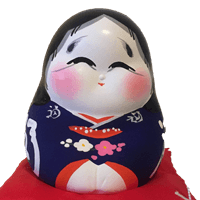
PARADE IS CANCELED DUE TO COVID-19.
Before the departure, a ritual is held at Kitamuki Ebisusha.
En voyage around 3 p.m.
Lanterns and Fukumusume leads Ebessan and Ebessab boat.
Ebessan on move.
A statue of Ebessan is in front of Kitamuki Ebisusha usually but it attends the cruise on the day.
And the next, Ebessan boat.
Fukumusume give bamboo grass to a shop owner.
And some of them pay a visit to Kansya Densya shrine and Kaisyo of Naginata boko of Gion matsuri festival.
Kansya Densya enshrines Nigimitama (Good aspect) of Susanoo no Mikoto, the Deity worshiped in Yasaka shrine and Kaisyo of Naginata boko enshrines Aramitama (Rough aspect) of him because both of Nigimiatama and Aramitama make perfection.
Around 5 p.m., they return to Yasaka shrine.
And Ebessan also returns where he might be.
Ebessan and Seven Deities of fortune
Ebessan えべっさん(恵比寿天)
As described in Japanese mythology, Ebessan has fishing rod and Tai fish (red snapper). He is a Deity of prosperity in business, cultivation and fishery. He is the only Deity of Japanese mythology in Seven Deities of fortune.
Daikoku ten 大黒天
Daikoku ten is a Deity for food and fortune. He is a Buddhist Deity and considered as the same Deity as Ohkuninushi no Mikoto of Japanese mythology in the fusion of Shinto and Buddhism.
Bishamon ten 毘沙門天
He is a Buddhist Deity and considered as the same Deity as Ebessan in the fusion of Shinto and Buddhism. He is worshiped as a Deity of war and Samurai warriors adored him in ancient times.
Benzai ten 弁財天
Benzaiten is a Buddhist Deity of music and treasure. She is considered as the same Deity as Ichiki Shima Hime no Mikoto of Japanese mythology in the fusion of Shinto and Buddhism. Now she is enshrined as Ichiki Shima Hime in Utsukushi Gozan sha in Yasaka shrine.
Fukurokuju 福禄寿
A Deity of the south pole in Taoism. He promises us long heatly life and birth of child.
寿老人
He also is a Deity of the south pole in Taoism. He promises us long life.
Hotei 布袋
He is a Buddhist monk in Tang dynasty of ancient China. He has a bag filled with good fortune to give to us.
How to get to Yasaka shrine?
Kyoto city bus: Gion bus stop. No. 100, 203, 206 etc, ara available.
Keihan railways: Gion Shijo station.
Hankyu railways: Kawaramachi station.

